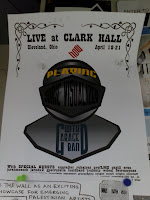Frame 2: Bigger-Picture. I work at a public liberal arts college, and that means something to me. It means that I take seriously higher education's obligation to help students become something very particular - adult citizens who have the mental habits, and the content background, to be informed and effective agents and decision-makers in any given field they may choose to pursue as adults, whether that be agriculture, business, scientific research, academia, medicine, advertising, or public policy. (I would argue that this last is especially relevant and central to the liberal arts mission historically; but that's a little beside the present point, so ignore it if you like.)
Why pay so much attention to the importance of "technology literacy" for our students? Well, there's a pretty clear prima facie reason: regardless of what field you care to examine, there's an ever-increasing integration of technology within that field, meaning that success in any given pursuit necessarily involves technology skill as part of the necessary preconditions. Publishing? Growing soybeans? Arts management? Surgery? Yeah, you're going to have to know how to use technology effectively - and we're not just talking about using Microsoft Word and email attachments, either. As William Pannapacker paraphrases Frederich Buechner, we need to help our students match their passions to the world's needs.
What are some of the most noteworthy issues current in our society - the sorts of issues we hope our students are prepared to engage effectively?
- Federal government: The U.S. Congress holds hearings on the status of a broken website
- Public policy: Edward Snowden initiates international debate on whistleblowing, privacy, surveillance
- Education: MOOCs, OER, competency-based learning
- International commerce: Bitcoin, algorithmic-driven stock trading
- Intellectual property: the Trans-Pacific Partnership's IP terms about DRM
Is it important for our students to have something to say about any of these things? Yes? A meaningful and informed opinion on healthcare.gov? Well then, I suppose that they'd better have the first clue about what makes for a well-designed and functional website, hadn't they? Oh, you want to make a robust case for legislation preventing government surveillance? Do you know the basics of network architecture, or security, or how data packets move from your iPhone to mine?
Frame 3: Is Our Professors Learning? Higher education, as a whole, seems slowly to be acknowledging that this kind of literacy is as properly within its purview as the other, traditional varieties of literacy. (And, in fact, if I were being careful, I'd be talking about multiple literacies here - technology literacy, information literacy, web literacy, data literacy...) And certainly there are pockets of scholarship and research embracing these literacies - just look at the explosive growth of digital humanities generally, or professional organizations and events like HASTAC, THATCamp, and NITLE.
It's great that higher education is professing its recognition of, and commitment to, providing these literacies as a baseline for any given undergraduate student, regardless of major or field, STEM or humanities. And it's great, too, that as time goes on, we're going to see more and more young academics hired into the academy with these technology literacies as a given part of their academic skillsets, and their pedagogical and research experiences. And it's great that higher education is providing support and professional development for faculty who don't bring technological literacy to the table.
At least, it's great in theory.
Someone named "Greg" commented, in response to an article in the Chronicle of Higher Education, published November 15, about a tech experience of his:
I didn't pursue it and was not willing to share the fact that I have no concept of what a broken link is, why it is important to me, and why as a faculty member there would be an expectation by anyone that I would know how to fix it. We might as well have been talking about magic beans.I wish I could say that this shocked me. Unfortunately, it didn't. It was right in line with my own experiences: as I've mentioned elsewhere, at my campus I'm several times more likely to work with a colleague who needs help creating an email attachment than with someone who knows CSS.
Many institutions would reply that they provide something like a Center for Teaching and Learning, some on-campus body to provide faculty with professional development opportunities. I'm not knocking this - I work in my college's Center for Academic Technology! - but let me ask you this:
If we seriously want students who are deeply-versed in technology and information literacies, will they gain that depth of skill, being taught by faculty who sat in an optional 1-hour workshop called "Basics of Social Media in the Classroom"?My sense is that the typical such Center does a great deal of intro-level development and training. (And, in all honesty, a fair amount of remedial training too.) I find it pretty scary to think of these issues in terms of "literacy" - because if we extend that metaphor, then higher education has a whole lotta barely-literate faculty. And I don't really have a good answer for what to do about that.
As usual, no answers, only questions (with occasional rhetorical flourishes). But I'd love your thoughts.












